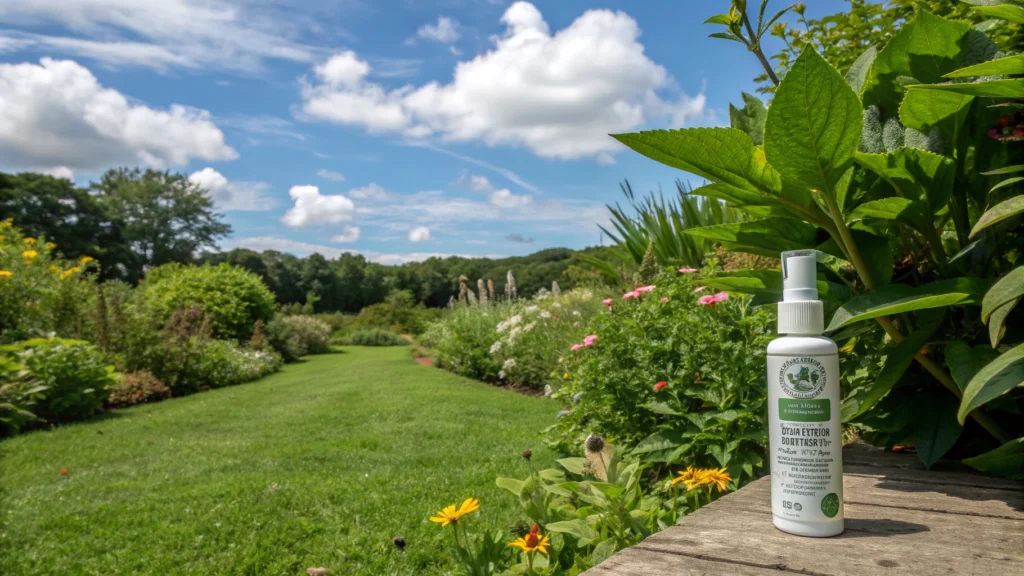Spending time outdoors often means dealing with pesky insects such as mosquitoes, flies, and ticks. While chemical sprays are common, many people today are embracing safer and eco-friendly choices. Using a natural insect repellent not only helps you avoid potentially harmful chemicals but also protects your health and the environment. In this detailed guide, we cover ten natural alternatives that are effective, affordable, and simple to use. You will also discover how to make your own repellents, understand safety tips, and learn what works best for different situations.
Why Choose Natural Insect Repellents?

More families are shifting toward natural insect repellent solutions because they want to reduce exposure to synthetic chemicals often found in commercial sprays. Traditional repellents may contain strong substances that irritate the skin or create harmful fumes when used in enclosed spaces. By choosing natural alternatives, you benefit from plant-based ingredients, essential oils, and sustainable methods that deter insects without harming your body. Additionally, natural options are often budget-friendly and eco-conscious. This makes them suitable for everyday use, especially if you want peace of mind in protecting children, pets, and the environment.
1. Essential Oils
Essential oils are among the most popular bases for creating a natural insect repellent. Many plants naturally repel certain insects, and their oils contain concentrated active compounds that provide strong protection. Common oils include:
- Lemon eucalyptus oil: Known for its power against mosquitoes, offering hours of protection.
- Lavender oil: Offers a pleasant fragrance while reducing bites from flies and mosquitoes.
- Peppermint oil: Effective against spiders, ants, and mosquitoes.
- Citronella oil: Commonly used in candles and sprays, this classic choice repels mosquitoes efficiently.
How to Use Essential Oils
Always dilute essential oils with a carrier oil, such as coconut or jojoba oil, before applying to the skin. For outdoor settings, mixing a few drops of essential oils with water inside a spray bottle allows you to refresh your repellent frequently. Essential oils can also be added to diffusers to create an insect-free zone indoors.
2. Garlic-Based Natural Solutions
Garlic is a natural powerhouse that not only boosts immunity but also works as a natural insect repellent. Its sulfur compounds produce a strong odor that drives away several pests, including mosquitoes and ticks. However, while the scent may fade for humans after digestion, insects detect it much more strongly. Eating garlic-rich foods may provide some protection, while sprays made from crushed garlic cloves can be applied around outdoor spaces to repel insects.
DIY Garlic Spray
- Crush 4–5 garlic cloves and add them into a bottle of water.
- Let the mixture sit overnight.
- Spray it around patios, doorways, or garden areas to repel insects naturally.
3. Herbs You Can Grow in Your Garden

Several herbs double as natural insect defenders and can be grown right in your backyard. Growing these plants is not only cost-effective but also enhances your garden aesthetics.
- Basil: Emits a fragrance that deters flies and mosquitoes.
- Rosemary: A hardy herb that naturally repels ticks and mosquitoes.
- Mint: Useful against ants, flies, and mosquitoes.
- Lemongrass: Produces citronella, a substance well-known as a natural insect repellent.
Tips for Growing Insect-Repelling Herbs
Planting these herbs around seating areas or kitchen gardens ensures a steady supply of fresh repellents. For example, crushing mint leaves or rosemary and rubbing them directly on your skin gives quick protection during outdoor activities.
4. Vinegar-Based Repellents
Apple cider vinegar or white vinegar can be turned into a simple and effective natural insect repellent. Insects dislike the strong acidic scent of vinegar, making it useful to deter ants, fruit flies, and even mosquitoes in certain situations.
How to Use Vinegar
- Mix vinegar with water and a few drops of essential oil for a spray blend.
- Set vinegar traps by leaving an open container near problem areas to attract and deter flies.
- Wipe down counters or outdoor tables with vinegar to reduce insect attraction.
5. Plants as Natural Deterrents
Besides herbs, ornamental plants can provide significant protection. For instance, marigolds release compounds that deter mosquitoes and aphids. Catnip has been found in studies to be more effective at repelling mosquitoes than DEET, one of the most common chemical repellents. Planting these in your yard creates a natural barrier.
Indoor Plant Protection
Some houseplants, such as lavender and rosemary, can keep indoor areas comfortable by driving away gnats and flies. The presence of such plants is multipurpose: they beautify interiors and work as eco-friendly insect defenders.
6. Natural Smoke and Incense
Smoke is a traditional deterrent used for centuries to ward off mosquitoes and other biting insects. You can create small fires with natural wood, dried herbs, or incense sticks derived from plant oils like citronella or sandalwood. These slowly release protective aromas into the air. Whenever you host outdoor gatherings such as barbecues, keeping natural incense near the seating area reduces insect presence without using synthetic sprays.
7. Carrier Oils and Safe Blends
Carrier oils such as coconut oil, jojoba oil, or almond oil provide a safe base for essential oils. For example, mixing lavender oil with coconut oil ensures the blend is gentle on the skin while maintaining repellent strength. Carrier oils also help the mixture last longer, as they act as moisturizing agents.
| Carrier Oil | Best For |
|---|---|
| Coconut oil | Mosquito repellents |
| Jojoba oil | Gentle applications for sensitive skin |
| Almond oil | Extended protection for outdoor activities |
8. Powder and Soil-Based Methods
Diatomaceous earth (DE) is a natural powder made from the remains of tiny aquatic organisms. While safe for humans and pets, it’s effective against crawling insects such as ants, fleas, and cockroaches. Sprinkle DE in cracks, along baseboards, and outdoor walkways to create a protective barrier. It serves as a powerful natural insect repellent within households where pests often set up colonies.
9. Homemade Spray Recipes
By combining elements like vinegar, herbs, and essential oils, you can create budget-friendly and personalized sprays. Below is a simple example recipe:
Citrus Herbal Spray
- Boil citrus peels in water for 15 minutes.
- Allow to cool and strain into a spray bottle.
- Add a few drops of lavender oil for an extra punch.
- Spray directly on clothes, outdoor furniture, or around doorways.
This DIY approach lets you experiment with scents you enjoy while keeping insects away.
10. Precautions and Safety Tips
Even though natural insect repellent options are generally safer, it’s important to follow several safety tips:
- Always perform a patch test on your skin before applying new essential oil blends.
- Keep sprays away from sensitive areas like the eyes and mouth.
- Pregnant women and young children should only use gentler options approved by healthcare professionals.
- Store all mixtures in labeled containers to prevent confusion.
Conclusion
Natural solutions can protect you effectively, whether you’re camping outdoors, working in your garden, or simply relaxing in your backyard. The ten methods outlined above show how versatile and potent nature can be. By using herbs, essential oils, smoke, or even soil powders, you reduce chemical exposure while enjoying peace of mind. More importantly, each practice makes your daily life healthier and more environmentally friendly. The next time insects try to spoil your fun, remember: a natural insect repellent is always within reach.




GIPHY App Key not set. Please check settings